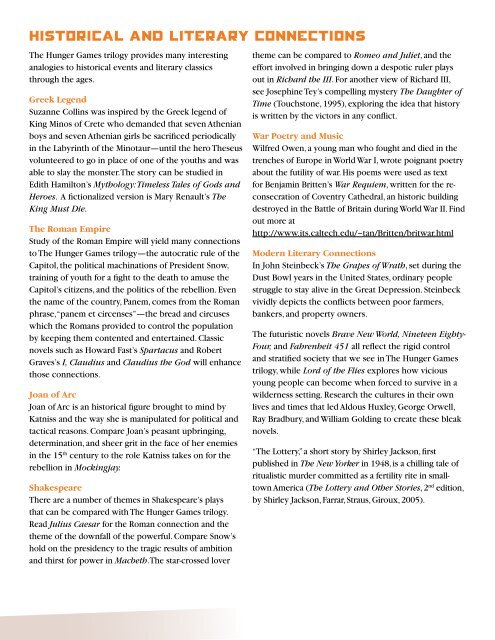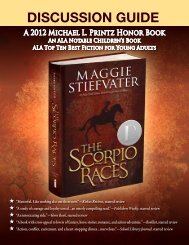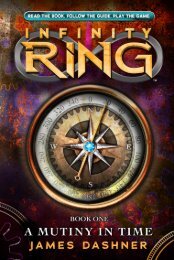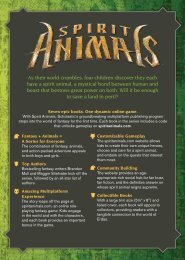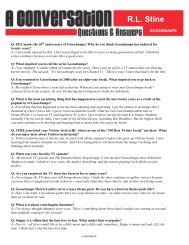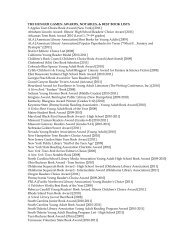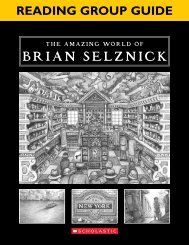Hunger Games Discussion Guide - Scholastic Media Room
Hunger Games Discussion Guide - Scholastic Media Room
Hunger Games Discussion Guide - Scholastic Media Room
You also want an ePaper? Increase the reach of your titles
YUMPU automatically turns print PDFs into web optimized ePapers that Google loves.
Historical and Literary Connections<br />
The <strong>Hunger</strong> <strong>Games</strong> trilogy provides many interesting<br />
analogies to historical events and literary classics<br />
through the ages.<br />
Greek Legend<br />
Suzanne Collins was inspired by the Greek legend of<br />
King Minos of Crete who demanded that seven Athenian<br />
boys and seven Athenian girls be sacrificed periodically<br />
in the Labyrinth of the Minotaur—until the hero Theseus<br />
volunteered to go in place of one of the youths and was<br />
able to slay the monster. The story can be studied in<br />
Edith Hamilton’s Mythology: Timeless Tales of Gods and<br />
Heroes. A fictionalized version is Mary Renault’s The<br />
King Must Die.<br />
The Roman Empire<br />
Study of the Roman Empire will yield many connections<br />
to The <strong>Hunger</strong> <strong>Games</strong> trilogy—the autocratic rule of the<br />
Capitol, the political machinations of President Snow,<br />
training of youth for a fight to the death to amuse the<br />
Capitol’s citizens, and the politics of the rebellion. Even<br />
the name of the country, Panem, comes from the Roman<br />
phrase, “panem et circenses”—the bread and circuses<br />
which the Romans provided to control the population<br />
by keeping them contented and entertained. Classic<br />
novels such as Howard Fast’s Spartacus and Robert<br />
Graves’s I, Claudius and Claudius the God will enhance<br />
those connections.<br />
Joan of Arc<br />
Joan of Arc is an historical figure brought to mind by<br />
Katniss and the way she is manipulated for political and<br />
tactical reasons. Compare Joan’s peasant upbringing,<br />
determination, and sheer grit in the face of her enemies<br />
in the 15 th century to the role Katniss takes on for the<br />
rebellion in Mockingjay.<br />
Shakespeare<br />
There are a number of themes in Shakespeare’s plays<br />
that can be compared with The <strong>Hunger</strong> <strong>Games</strong> trilogy.<br />
Read Julius Caesar for the Roman connection and the<br />
theme of the downfall of the powerful. Compare Snow’s<br />
hold on the presidency to the tragic results of ambition<br />
and thirst for power in Macbeth. The star-crossed lover<br />
theme can be compared to Romeo and Juliet, and the<br />
effort involved in bringing down a despotic ruler plays<br />
out in Richard the III. For another view of Richard III,<br />
see Josephine Tey’s compelling mystery The Daughter of<br />
Time (Touchstone, 1995), exploring the idea that history<br />
is written by the victors in any conflict.<br />
War Poetry and Music<br />
Wilfred Owen, a young man who fought and died in the<br />
trenches of Europe in World War I, wrote poignant poetry<br />
about the futility of war. His poems were used as text<br />
for Benjamin Britten’s War Requiem, written for the reconsecration<br />
of Coventry Cathedral, an historic building<br />
destroyed in the Battle of Britain during World War II. Find<br />
out more at<br />
http://www.its.caltech.edu/~tan/Britten/britwar.html<br />
Modern Literary Connections<br />
In John Steinbeck’s The Grapes of Wrath, set during the<br />
Dust Bowl years in the United States, ordinary people<br />
struggle to stay alive in the Great Depression. Steinbeck<br />
vividly depicts the conflicts between poor farmers,<br />
bankers, and property owners.<br />
The futuristic novels Brave New World, Nineteen Eighty-<br />
Four, and Fahrenheit 451 all reflect the rigid control<br />
and stratified society that we see in The <strong>Hunger</strong> <strong>Games</strong><br />
trilogy, while Lord of the Flies explores how vicious<br />
young people can become when forced to survive in a<br />
wilderness setting. Research the cultures in their own<br />
lives and times that led Aldous Huxley, George Orwell,<br />
Ray Bradbury, and William Golding to create these bleak<br />
novels.<br />
“The Lottery,” a short story by Shirley Jackson, first<br />
published in The New Yorker in 1948, is a chilling tale of<br />
ritualistic murder committed as a fertility rite in smalltown<br />
America (The Lottery and Other Stories, 2 nd edition,<br />
by Shirley Jackson, Farrar, Straus, Giroux, 2005).


